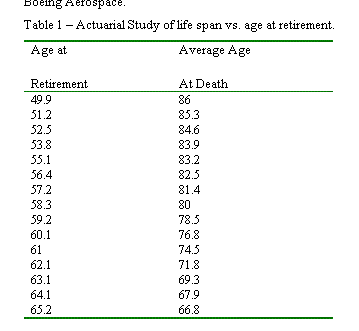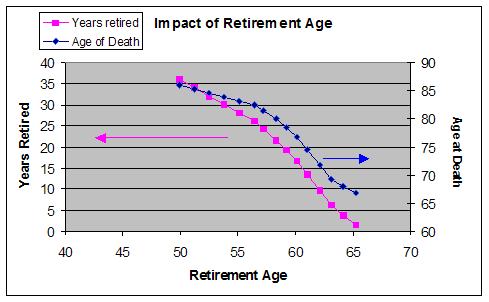Here's a quote from one of Ted's farewell posts that made me go "Hmmm...":
"And one of those facts, which Alan Greenspan recognized just yesterday in calling for paring back future social security benefits, is that people who retire totally represent a drain on the economy."
My records show that I've paid about $45K into SS between 1977 and 2002. I sure hope the govt invests it wisely because I can't withdraw my first dollar until the end of 2022. When I tap into that "mother lode" I'll be withdrawing $9873.60/year (2003 dollars), which I may actually be able to spend all in one place... especially after I pay taxes on 85% of that.
So even if I live to trip digits (2060) I'll withdraw less than $400K (before taxes!) from that $45K DCA investment.
Does anyone think that I'm draining the economy to get that "free" money? I'll have to play around with the spreadsheet, correct to present dollars for an assumed 3.5% inflation, and see what I could get if I invested it on my own. I'm glad I quit working before I ended up even further behind.
BTW, all those years of work generated a bunch of credits-- we'll call them "dollars"-- that I've been able to invest toward even MORE credits. People are paying me for the temporary use of those credits so I'm comforted by the thought that I'm not draining anyone of assets. Presumably the future credits will purchase about 3.5% less per year, but no matter what they purchase I'm not supposed to spend more than the credits I have in that account. I don't plan to do that before I die, so I don't see how I'm draining the economy.
My kid might even be lucky enough to get some of those credits that haven't been used. So technically, by worknig to earn credits that I didn't use, doesn't that mean that the economy drained me?!? Again, I'm glad I quit working when I did.
Does anyone wonder why they call it the dismal science?
"And one of those facts, which Alan Greenspan recognized just yesterday in calling for paring back future social security benefits, is that people who retire totally represent a drain on the economy."
My records show that I've paid about $45K into SS between 1977 and 2002. I sure hope the govt invests it wisely because I can't withdraw my first dollar until the end of 2022. When I tap into that "mother lode" I'll be withdrawing $9873.60/year (2003 dollars), which I may actually be able to spend all in one place... especially after I pay taxes on 85% of that.
So even if I live to trip digits (2060) I'll withdraw less than $400K (before taxes!) from that $45K DCA investment.
Does anyone think that I'm draining the economy to get that "free" money? I'll have to play around with the spreadsheet, correct to present dollars for an assumed 3.5% inflation, and see what I could get if I invested it on my own. I'm glad I quit working before I ended up even further behind.
BTW, all those years of work generated a bunch of credits-- we'll call them "dollars"-- that I've been able to invest toward even MORE credits. People are paying me for the temporary use of those credits so I'm comforted by the thought that I'm not draining anyone of assets. Presumably the future credits will purchase about 3.5% less per year, but no matter what they purchase I'm not supposed to spend more than the credits I have in that account. I don't plan to do that before I die, so I don't see how I'm draining the economy.
My kid might even be lucky enough to get some of those credits that haven't been used. So technically, by worknig to earn credits that I didn't use, doesn't that mean that the economy drained me?!? Again, I'm glad I quit working when I did.
Does anyone wonder why they call it the dismal science?


